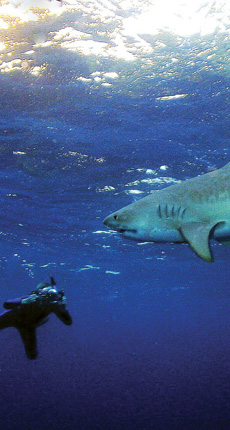Befriending a Formidable Predator
R.J. Dunlap Marine Conservation Program promotes marine conservation while providing hands-on learning for students.
Most of us don’t typically think of sharks as a species in urgent need of adopting. But students are learning just how urgently important these predators are to the marine environment, as well as many other important environmental lessons, via the R.J. Dunlap Marine Conservation Program.
A joint program of the Rosenstiel School of Marine and Atmospheric Science and the Leonard and Jayne Abess Center for Ecosystem Science and Policy, the R.J. Dunlap Marine Conservation Program was founded in January 2010. Named in honor of businessman and conservationist Richard James Dunlap and led by Rosenstiel School research assistant professor and shark expert Neil Hammerschlag, the program combines field and virtual expeditions with virtual learning experiences to dramatize the importance of oceans in our daily lives, raise awareness of the threats facing ocean resources and their adjacent coasts, and explore solutions for conservation.
The program complements UM’s internationally recognized programs in marine and ecosystem science and fosters innovative interdisciplinary approaches to emerging environmental issues. The Rosenstiel School offers one of the largest, most dynamic marine and atmospheric programs in the nation, providing cutting-edge scientific support for the program. The Abess Center, led by University of Miami Professor and National Geographic Emerging Explorer Kenny Broad, provides support in the form of innovative initiatives that bridge the gap between hard science and environmental policy.
The program follows the model established by the South Florida Student Shark Program (SFSSP), a collaborative, multi-disciplinary research and education program. Founded in 2006 by David Dié and Rosenstiel School research assistant professor Neil Hammerschlag, the SFSSP is a full-immersion program that focuses primarily on the study and conservation of Floridian shark species, encouraging students to take an active role in modern scientific education and research.
“This generous gift is enabling us to expand the program to address other marine species and reach new audiences around the world,” says Hammerschlag. “One unique offering is our ‘Adopt a Shark’ program, which will enable us to track great hammerhead and bull sharks using sophisticated satellite tags that students will help to attach to live animals that will allow us to better understand their migratory routes and habits, which will assist us in creating stronger policies to protect these critically threatened species.”
